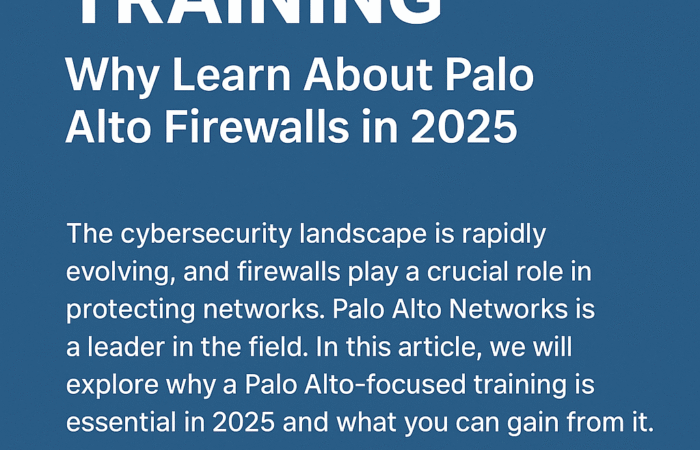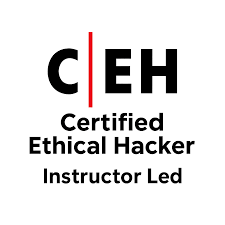Palo Alto Training – Learn Palo Alto Firewalls in 2025

As the demand for cybersecurity professionals continues to grow, the role of a Certified Ethical Hacker (CEH) has become one of the most sought-after positions in the field. Ethical hackers use the same tools and techniques as malicious hackers—but for a good purpose: to protect organizations from attacks by identifying vulnerabilities before they can be […]

As the demand for cybersecurity professionals continues to grow, the role of a Certified Ethical Hacker (CEH) has become one of the most sought-after positions in the field. Ethical hackers use the same tools and techniques as malicious hackers—but for a good purpose: to protect organizations from attacks by identifying vulnerabilities before they can be exploited.
In this article, we bring you a candid interview with Amit Sharma, a Certified Ethical Hacker with over six years of experience in penetration testing and red team operations. He shares his personal experiences, study strategies, common mistakes to avoid, and practical tips for aspiring CEHs.
Amit Sharma: My journey started during college when I attended a seminar on cybersecurity. I was fascinated by the idea of hacking—but legally, for good. After graduation, I worked in IT support, but I always had the urge to understand how systems could be broken into and defended. CEH was a natural fit because it offered structured training on how to think like a hacker.
Amit: I gave myself about 3 months to prepare. I used the official EC-Council courseware, which includes eBooks, videos, and iLabs for hands-on practice. I broke down my preparation into three phases:
One thing I’d emphasize is practice—you can’t just memorize tools. You have to understand how they work and why you use them in certain scenarios.
Amit: Time management. The CEH exam consists of 125 multiple-choice questions to be completed in 4 hours. Some questions are lengthy and scenario-based, and you have to read carefully before answering. I made the mistake of spending too much time on the first 30 questions and had to rush toward the end.
Also, questions about compliance frameworks and legal aspects were more detailed than I expected. Fortunately, I had reviewed HIPAA, GDPR, and PCI-DSS just a few days before the exam.
Amit: Besides the EC-Council courseware, here’s what I found helpful:
Just be cautious with unofficial brain dumps—they can be outdated or incorrect. Focus on understanding concepts.
Amit: Absolutely. A few months after getting certified, I was hired to perform a vulnerability assessment for a mid-sized financial company. Using techniques I learned in CEH—like port scanning, service enumeration, and exploiting weak authentication—I discovered an exposed SMB share and gained access to sensitive internal documentation.
More importantly, I provided a detailed remediation plan. That’s something CEH emphasizes: ethical responsibility. You’re not just there to break things—you’re there to help fix them.
Amit:
Amit: I currently work as a penetration tester in a cybersecurity consulting firm. A typical day might include:
It’s a dynamic and challenging job. No two days are the same, and that’s what keeps it exciting.
Amit: Yes—if you use it the right way. CEH is often criticized for being too theoretical, but it provides a strong foundation and industry-recognized credibility. It helped me land interviews and gain trust in client-facing roles. That said, I always recommend combining CEH with practical learning—like OSCP or CHFI—to build a well-rounded skill set.
Amit: Start with learning the fundamentals—networking, operating systems, and basic scripting. Then dive into CEH with a mix of theory and practice.
Here are my top tips:
Also, stay curious. The best hackers aren’t the smartest—they’re the most inquisitive.
Amit’s journey is a great example of how the CEH certification can open doors and empower cybersecurity professionals with both the knowledge and credibility to succeed. His practical insights highlight that passing CEH is not about memorization, but about understanding the attacker’s mindset, mastering the tools of the trade, and maintaining a strong ethical foundation.
Whether you’re an IT professional looking to pivot into cybersecurity or a student aiming to build a career in ethical hacking, the CEH certification can be a significant first step—if approached with the right mindset.
For official CEH exam details, training materials, and registration, visit:
https://securevalley-training.net/certified-ethical-hacker-ceh-fr/https://securevalley-training.net/certified-ethical-hacker-ceh-fr/
Get certified with industry-leading cybersecurity certifications from EC-Council, PECB, Palo Alto Networks, and more.

Learn from world-class instructors Collaborate with top professionals Advanced training...

The CEH is the world's leading cybersecurity certification, recognized by...

Onsite training course Led by an instructor Interactive sessions

Asynchronous, self-study environment Video-streaming format Flexible learning schedule
Adding {{itemName}} to cart
Added {{itemName}} to cart

